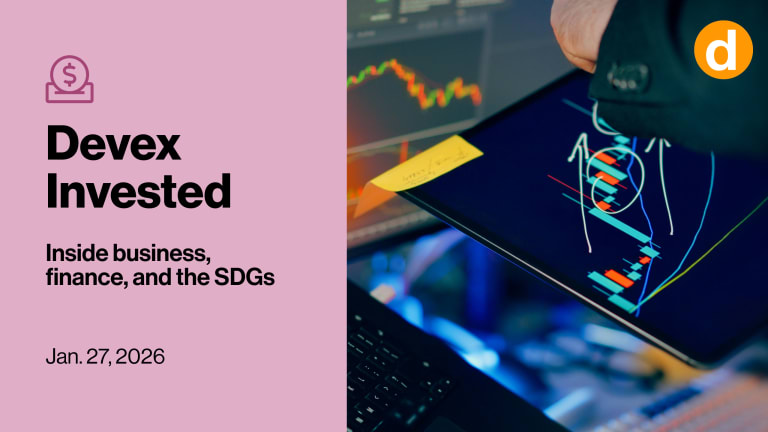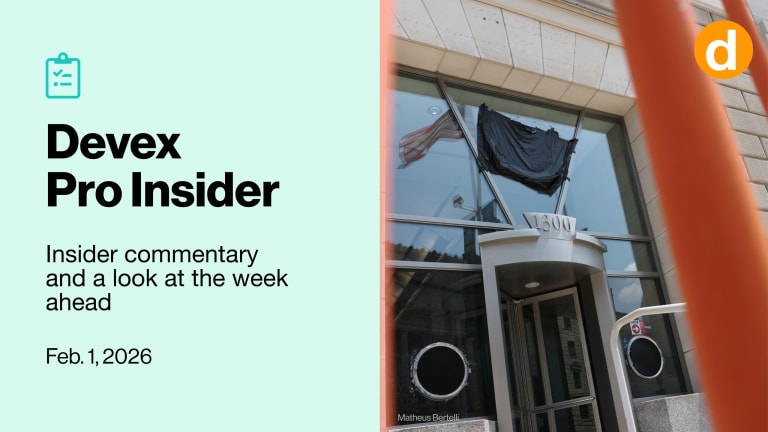
Makhtar Diop, who was named the head of the International Finance Corporation on Thursday, said he is joining the institution at a “critical juncture in the global recovery” and will push it to do more work in the world’s poorest and most fragile states, especially in Africa.
IFC’s mission is “more important than ever,” and the institution is “well-suited” to respond to the challenge of COVID-19, Diop said on a call with a small group of journalists Thursday.
Diop, a Senegalese former finance minister, is IFC’s first African leader and comes to the institution after a long career at the World Bank, where he is currently serving as vice president for infrastructure.
Diop was brought on to strengthen the implementation of IFC’s mission and its IFC 3.0 strategy, which aims to refocus the institution on delivering greater development impact in the world’s poorest countries, World Bank President David Malpass said on the same call.
“He brings deep experience and understanding of both public and private sectors and a track record of service to our client countries,” Malpass said. “His leadership experience will enable us to build on the idea and the speed and scale of the response to the global crisis that we've undertaken.”
Diop was welcomed with positive statements from global development leaders, many of whom praised his work and cheered the choice of an African for the post.
“Having an African as head of IFC will have an impact on its intervention on the continent as his experience and real-like knowledge of our economies and our populations’ potential will drive new partnership patterns with more adapted assistance to the States,” Papa Amadou Sarr, Senegal’s minister, general delegate for entrepreneurship, told Devex in an email.
Diop’s diverse background makes him “a superb choice on multiple levels,” said Jonathan Papoulidis, World Vision’s executive adviser on fragile states. “He is a deeply connected, trusted, dynamic figure in the bank.”
But Diop is in for a hard test and will have to prove himself, experts say — both to the aid community looking for a more development- than deal-oriented IFC, and to investors and businesses that might question his lack of private sector experience.
The choice
Diop emerged after a long selection process that included more than 130 applicants, according to Malpass.
Candidates had to express their interest in August, and the search committee initially intended to begin interviews in September, according to an internal memo Devex has seen. It is unclear if that happened or why the process took so long.
Some had hoped that the World Bank Group board would finally choose a woman to lead IFC, which has always been led by men. A woman IFC head is “way overdue,” and the World Bank Group missed an opportunity to choose one, Bart Edes, former senior staff member at the Asian Development Bank, told Devex.
While the World Bank Group cannot comment on the selection process and whether any women were finalists for the post, several sources with knowledge of the process told Devex that women were vetted. The World Bank Group seemed aware of this shortcoming, though it didn’t acknowledge it explicitly.
On Thursday it announced that Stephanie von Friedeburg, who has served as IFC’s acting managing director since Philippe Le Houérou stepped down in October, has been named a senior vice president and would join the senior leadership team, serving alongside Diop.
“The question with someone with a background in government, sovereign operations, is how equipped he is to lead IFC 3.0 to create markets and mobilize private capital at scale.”
— Bart Edes, former senior staff member, Asian Development BankWith Diop, the board chose a World Bank veteran rather than someone from the private sector, which many IFC staff members had likely hoped for, Edes said.
“He’s going to have to win over IFC staff,” he said, adding that the World Bank and IFC have big cultural differences.
“The question with someone with a background in government, sovereign operations, is how equipped he is to lead IFC 3.0 to create markets and mobilize private capital at scale. There is a lot riding on his shoulders,” Edes said.
Diop’s priorities
Diop will take the helm at IFC on March 1 and will oversee IFC’s 3.0 strategy, launched in 2018, along with its $5.5 billion capital increase. That includes efforts to boost investments in the world’s lowest-income and most fragile countries, and IFC’s work to create investable projects with its “upstream” work.
“I plan to build on the vision of my predecessor,” Diop said on the call. “As I join IFC, my goal is to help bring back investment flows in emerging countries, to preserve jobs, to create long-term employment opportunities, especially in the poorest countries.”
COVID-19 response will clearly be an early top priority. In addition, Africa has the greatest need for private sector development, and for the IFC 3.0 strategy to succeed it must succeed in Africa, Diop said.
In fiscal year 2020, just shy of 20% of IFC investments were in sub-Saharan Africa, less than in both Latin America and the Carribean, and East Asia and the Pacific. IFC will need to boost its investments on the African continent significantly beyond 17% of its total portfolio to meet its ambitious target of tripling investment in the world’s lowest-income and most fragile countries.
Diop said he’d like to build on the successful model of the Scaling Solar initiative, through which IFC and the World Bank dramatically reduced the cost of solar on the continent by building a platform, standardizing documents, and improving utility companies. IFC is looking at creating similar platforms for wind energy and urban mobility, that would also bring in the private sector, Diop said.
Diop would also like to “bring clarity to the institutional investor” about risk in Africa. As finance and economy minister of Senegal, in 2000 he requested the first sovereign credit rating in sub-Saharan Africa other than South Africa. Other countries followed, and the result was a reduction in the risk premium on Africa, he said.
IFC must also have a greater presence on the ground, Diop said, adding that decentralization of staff will be critical. The institution has launched a “big effort” to move more staff to a variety of countries so they can work more directly with people and policymakers and find opportunities, he said.
As the announcement was made public Thursday, Diop said he’d already received two calls from heads of state asking how they can work on improving investment in fragile states and in the Sahel.
“That would be the day one, No. 1 priority,” he said.
Challenges ahead
IFC will have to prove that it can follow through on ambitious commitments and reforms that it has promised over the next decade, which means Diop will have his work cut out for him, experts said.
“We look forward to engaging with Mr. Diop on the successful implementation of reforms approved by the IFC last year, including a freeze on investments in for-profit schools, greater transparency in financial intermediary lending and strengthening its accountability system,” Nadia Daar, the head of Oxfam International, said in a statement.
She also urged Diop to engage civil society, focus on transparency, and ensure IFC projects are chosen based on development impact and don’t have negative consequences for climate or human rights.
Diop should prioritize instrustructure investments “that will foster economic development and lead to more competitiveness and attractiveness of the continent,” Sarr said. IFC should also focus on boosting investments for women and youth entrepreneurship, particularly in key sectors that will foster economic growth and strengthen the private sector at different levels, he added.
As IFC tries to move to more fragile places, it has to “be very adaptive and have a solid learning, iterating mode,” Papoulidis said. It may need to shift career incentives and improve security to encourage staff to work elsewhere. Being on the ground will allow IFC to “walk alongside and learn” with businesses, which will help them determine which investments or incentives are needed, he said.
Some of his greatest challenges may be ones that have been around at IFC for a while, including the institution’s scale, focus, and emphasis on “chasing deals rather than chasing development,” a trio of Center for Global Development experts wrote Thursday.
“The new managing director should prioritize the real clients of the IFC — not private companies but developing countries and the people who live in them,” they wrote. “That would mean working with governments to help deliver private sector solutions that fit within development and industrial strategies and working with communities to ensure IFC financed projects sustain livelihoods.”
Update, Feb. 19, 2021: This article has been updated to include comments from Papa Amadou Sarr.








